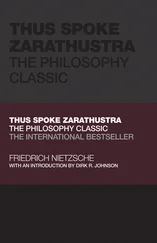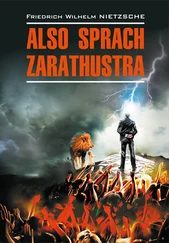Chapter XLVIII. Before Sunrise.
Here we have a record of Zarathustra's avowal of optimism, as also the important statement concerning "Chance" or "Accident" (verse 27). Those who are familiar with Nietzsche's philosophy will not require to be told what an important role his doctrine of chance plays in his teaching. The Giant Chance has hitherto played with the puppet "man,"—this is the fact he cannot contemplate with equanimity. Man shall now exploit chance, he says again and again, and make it fall on its knees before him! (See verse 33 in "On the Olive Mount", and verses 9–10 in "The Bedwarfing Virtue").
Chapter XLIX. The Bedwarfing Virtue.
This requires scarcely any comment. It is a satire on modern man and his belittling virtues. In verses 23 and 24 of the second part of the discourse we are reminded of Nietzsche's powerful indictment of the great of to–day, in the Antichrist (Aphorism 43):—"At present nobody has any longer the courage for separate rights, for rights of domination, for a feeling of reverence for himself and his equals,—FOR PATHOS OF DISTANCE…Our politics are MORBID from this want of courage!—The aristocracy of character has been undermined most craftily by the lie of the equality of souls; and if the belief in the 'privilege of the many,' makes revolutions and WILL CONTINUE TO MAKE them, it is Christianity, let us not doubt it, it is CHRISTIAN valuations, which translate every revolution merely into blood and crime!" (see also "Beyond Good and Evil", pages 120, 121). Nietzsche thought it was a bad sign of the times that even rulers have lost the courage of their positions, and that a man of Frederick the Great's power and distinguished gifts should have been able to say: "Ich bin der erste Diener des Staates" (I am the first servant of the State.) To this utterance of the great sovereign, verse 24 undoubtedly refers. "Cowardice" and "Mediocrity," are the names with which he labels modern notions of virtue and moderation.
In Part III., we get the sentiments of the discourse "In the Happy Isles", but perhaps in stronger terms. Once again we find Nietzsche thoroughly at ease, if not cheerful, as an atheist, and speaking with vertiginous daring of making chance go on its knees to him. In verse 20, Zarathustra makes yet another attempt at defining his entirely anti–anarchical attitude, and unless such passages have been completely overlooked or deliberately ignored hitherto by those who will persist in laying anarchy at his door, it is impossible to understand how he ever became associated with that foul political party.
The last verse introduces the expression, "THE GREAT NOONTIDE!" In the poem to be found at the end of "Beyond Good and Evil", we meet with the expression again, and we shall find it occurring time and again in Nietzsche's works. It will be found fully elucidated in the fifth part of "The Twilight of the Idols"; but for those who cannot refer to this book, it were well to point out that Nietzsche called the present period—our period—the noon of man's history. Dawn is behind us. The childhood of mankind is over. Now we KNOW; there is now no longer any excuse for mistakes which will tend to botch and disfigure the type man. "With respect to what is past," he says, "I have, like all discerning ones, great toleration, that is to say, GENEROUS self–control…But my feeling changes suddenly, and breaks out as soon as I enter the modern period, OUR period. Our age KNOWS…" (See Note on Chapter LXX.).
Chapter LI. On Passing–by.
Here we find Nietzsche confronted with his extreme opposite, with him therefore for whom he is most frequently mistaken by the unwary. "Zarathustra's ape" he is called in the discourse. He is one of those at whose hands Nietzsche had to suffer most during his life–time, and at whose hands his philosophy has suffered most since his death. In this respect it may seem a little trivial to speak of extremes meeting; but it is wonderfully apt. Many have adopted Nietzsche's mannerisms and word–coinages, who had nothing in common with him beyond the ideas and "business" they plagiarised; but the superficial observer and a large portion of the public, not knowing of these things,—not knowing perhaps that there are iconoclasts who destroy out of love and are therefore creators, and that there are others who destroy out of resentment and revengefulness and who are therefore revolutionists and anarchists,—are prone to confound the two, to the detriment of the nobler type.
If we now read what the fool says to Zarathustra, and note the tricks of speech he has borrowed from him: if we carefully follow the attitude he assumes, we shall understand why Zarathustra finally interrupts him. "Stop this at once," Zarathustra cries, "long have thy speech and thy species disgusted me…Out of love alone shall my contempt and my warning bird take wing; BUT NOT OUT OF THE SWAMP!" It were well if this discourse were taken to heart by all those who are too ready to associate Nietzsche with lesser and noiser men,—with mountebanks and mummers.
Chapter LII. The Apostates.
It is clear that this applies to all those breathless and hasty "tasters of everything," who plunge too rashly into the sea of independent thought and "heresy," and who, having miscalculated their strength, find it impossible to keep their head above water. "A little older, a little colder," says Nietzsche. They soon clamber back to the conventions of the age they intended reforming. The French then say "le diable se fait hermite," but these men, as a rule, have never been devils, neither do they become angels; for, in order to be really good or evil, some strength and deep breathing is required. Those who are more interested in supporting orthodoxy than in being over nice concerning the kind of support they give it, often refer to these people as evidence in favour of the true faith.
Chapter LIII. The Return Home.
This is an example of a class of writing which may be passed over too lightly by those whom poetasters have made distrustful of poetry. From first to last it is extremely valuable as an autobiographical note. The inevitable superficiality of the rabble is contrasted with the peaceful and profound depths of the anchorite. Here we first get a direct hint concerning Nietzsche's fundamental passion—the main force behind all his new values and scathing criticism of existing values. In verse 30 we are told that pity was his greatest danger. The broad altruism of the law–giver, thinking over vast eras of time, was continually being pitted by Nietzsche, in himself, against that transient and meaner sympathy for the neighbour which he more perhaps than any of his contemporaries had suffered from, but which he was certain involved enormous dangers not only for himself but also to the next and subsequent generations (see Note B., where "pity" is mentioned among the degenerate virtues). Later in the book we shall see how his profound compassion leads him into temptation, and how frantically he struggles against it. In verses 31 and 32, he tells us to what extent he had to modify himself in order to be endured by his fellows whom he loved (see also verse 12 in "Manly Prudence"). Nietzsche's great love for his fellows, which he confesses in the Prologue, and which is at the root of all his teaching, seems rather to elude the discerning powers of the average philanthropist and modern man. He cannot see the wood for the trees. A philanthropy that sacrifices the minority of the present–day for the majority constituting posterity, completely evades his mental grasp, and Nietzsche's philosophy, because it declares Christian values to be a danger to the future of our kind, is therefore shelved as brutal, cold, and hard (see Note on Chapter XXXVI.). Nietzsche tried to be all things to all men; he was sufficiently fond of his fellows for that: in the Return Home he describes how he ultimately returns to loneliness in order to recover from the effects of his experiment.
Читать дальше











